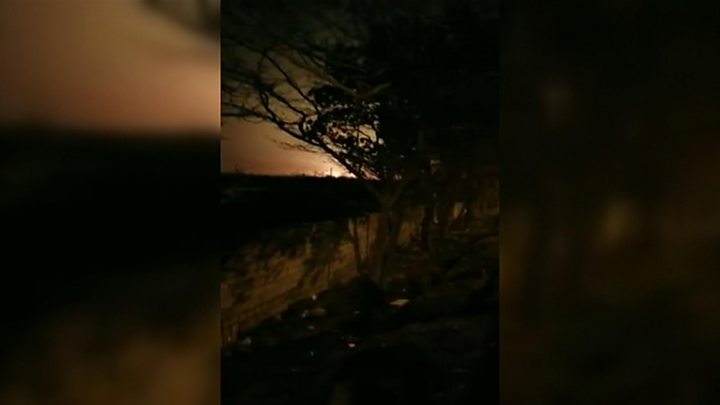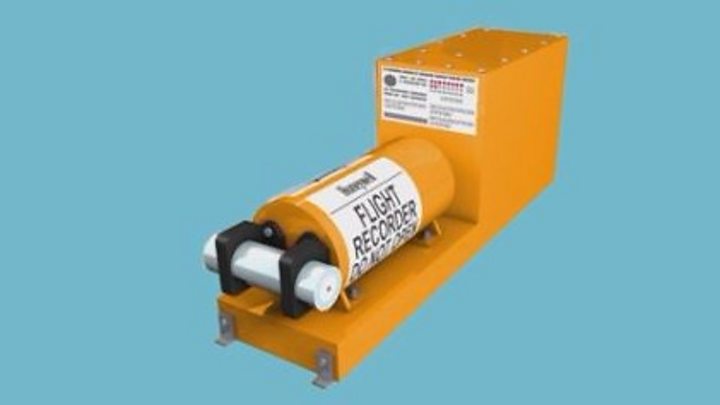Media playback is unsupported on your device
It is too soon to draw any conclusions on what brought down a Ukrainian passenger plane in Iran on Wednesday, Ukraine's foreign minister has said.
"We have so many different versions of what could [have] happened to the plane that we need some time to really understand," Vadym Prystaiko said.
His comments come a day after Western powers said they had strong evidence that the plane was hit by an Iranian missile – a claim rejected by Tehran.
All 176 people on board were killed.
The crash of Ukraine International Airlines flight PS752 near Tehran airport came just hours after Iran carried out missile strikes on two airbases housing US forces in Iraq.
US media have speculated that the Boeing 737-800 may have been mistaken for a warplane as Iran prepared for possible American retaliation.
Footage has emerged purportedly showing a plane being hit by a projectile over the Iranian capital.
Victims of the crash included 82 Iranians, 63 Canadians and 11 Ukrainians as well as nationals from Sweden, the UK, Afghanistan and Germany.
Iran has promised a full investigation. However, TV images from the crash site on Thursday showed a mechanical digger helping to clear debris away, raising concerns that important evidence could have been removed.
Meanwhile, the so-called "black box" recovered from the wreckage was due to be opened on Friday, Iran's official Irna news agency reported.
Black boxes contain the flight data recorder and the cockpit voice recorder, and could provide vital clues about what caused the crash.
What does Ukraine say?
At Friday's news briefing in Ukraine's capital Kyiv, Mr Prystaiko reiterated that at this stage Ukrainian investigators were not ruling out any possible cause of the crash.
But he called for the "level of speculation" to be reduced, adding that Ukraine wanted to establish an "international coalition" to conduct a thorough investigation.

Media playback is unsupported on your device
Mr Prystaiko said nearly 50 Ukrainian investigators were already working in Iran, and there was "full co-operation" from Tehran.
"We are analysing pieces of the body of the plane, we are analysing the bodies of the people who died in the crash.
"We are analysing the chemical residues on the body of the plane. We will come to our conclusion, we don't want to come to them right now.
"Our team has now got access to the black boxes," he said, stressing that Ukraine wanted them to be analysed in Kyiv.
Iran earlier said it would download the information itself, adding that the process could take up to two months.
Kyiv earlier said the US had passed on "important data" about the crash, without providing any further details.
Ukraine's team in Iran includes experts who worked on the investigation into the 2014 downing by a missile of Malaysia Airlines flight MH17 in eastern Ukraine.

Media playback is unsupported on your device
What does Iran say?
Earlier on Friday, Iran's Civil Aviation Organisation (CAOI) chief Ali Abedzadeh repeated his view that a missile was not the cause of the crash.
"The thing that is clear to us and that we can say with certainty is that this plane was not hit by a missile," he told reporters.
On Thursday, government spokesman Ali Rabiei accused the US and its allies of "lying and engaging in psychological warfare" in their speculation over the cause of the accident.
An Iranian official told the BBC on Friday that there was documentation to prove that the plane had a mechanical issue before take-off. It was not signed off for flying, but Ukrainian airline officials had overruled these objections, the official said, without giving further details.
What has been said about a possible missile strike?
Canadian Prime Minister Justin Trudeau said he had received intelligence from multiple sources indicating the plane was shot down by an Iranian surface-to-air missile, adding that it was possible that this was unintentional.
"This reinforces the need for a thorough investigation," he said. "Canadians have questions and they deserve answers."
But he said it was too early to apportion blame or draw any conclusions, and refused to go into detail about the evidenceRead More – Source



